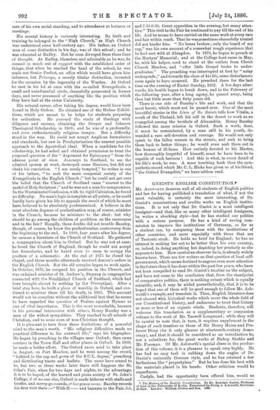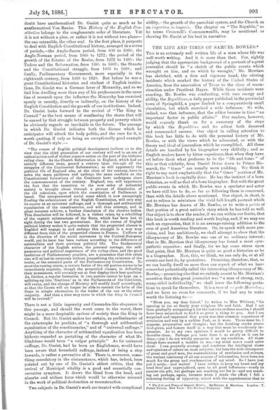GNEIST'S ENGLISH CONSTITUTION.*
M.B. ASHWORTH deserves well of all students of English politics and law for having published a translation of what, if not the most valuable, is certainly the most interesting, of Dr. Gneist's conscientious and erudite works on English institu- tions. It is not only that Dr. Gneist is a most intelligent foreigner—and that, like so many other intelligent foreigners, he writes a shocleing style—but be has studied our politics with a serious purpose. He has a kind of roving com- mission to improve the institutions of Germany, so far as a student can, by comparing them with the institutions of other countries, and more especially with those that are of Teutonic stock. He holds no brief for England ; be has no interest in making her out to be better than his own country, or, indeed, in doing anything but depicting her precisely as she appears to him. How careful an observer he is, is already widely known here. There are few writers on that question of local self- government, which seems destined to engross even more attention in the future than it has done within the past few years, who have not been compelled to read Dr. Gneist's treatise on the subject, and have not come to the conclusion that, from the standpoint of comparative politics, there is nothing extant which is equally scientific, and, it may be added parenthetically, that it is to be hoped that one of them will be good enough to follow Mr. Ash- worth's example, and translate it. Then, English literature does not abound witli historical works which cover the whole field of our Constitutional history, and endeavour to treat that history as more or less of an organic whole. Students, therefore, will welcome this translation as a supplementary or companion volume to the work of Mr. Taswell Lougmead ; while they will be careful to note that, in turn, it requires supplement in the shape of such treatises as those of Sir Henry Maine and Pro- fessor Dicey (for it only glances at nineteenth-century demo- cracy), and that it should be considered as an introduction to, not a substitute for, the great works of Bishop Stubbs and Mr. Freeman. Of Mr. Ashworth's special share in the produc- tion of this volume, it is a pleasure to speak very highly. He has had no easy task in rubbing down the angles of Dr. Gneist's eminently German style, and he has retained a few barbarisms like " propertyless." But he has done his best with the materials placed in his hands. Other criticism would be superfluous.
Carlyle, had the opportunity been offered him, would no
* The History of the English Constitution. By Dr. Rudolph Gneist, Professor of Law in the University of Berlin. Translated by Philip A. Ashworth, Barrister- at-Law. London : William Olowes and Son. 1896. doubt have anathematised Dr. Gneist quite as much as he anathematised. Von Ranke. This History of the English Con- stitution belongs to the conglomerate order of literature. Yet it is not without a plan, or rather it is not without two plans— the one ostensible, the other real. In the first place, it purports to deal with English Constitutional history, arranged in a series of periods,—the Anglo-Saxon period, from 800 to 1066; the Anglo-Norman period, from 1066 to 1272 ; the period of the growth of the Estates of the Realm, from 1272 to 1455; the Tudors and the Reformation, from 1485 to 1603 ; the Stuarts and the Constitutional struggle, from 1603 to 1688 ; and finally, Parliamentary Government, more especially in the eighteenth century, from 1689 to 1820. But before he was a great Constitutional historian and student of English institu- tions, Dr. Gneist was a German lover of Monarchy, and so we find him dwelling more than any of his predecessors in the same line of research upon the influence the Monarchy has exercised openly or secretly, directly or indirectly, on the history of the English Constitution and the growth of our institutions. Indeed, Dr. Gneist looks forward to the revival of "The King in Council " as the best means of weathering the storm that will be caused by that struggle between property and poverty which he obviously regards as inevitable in the future. The passage in which Dr. Gneist indicates both the disease which he anticipates will attack the body politic, and the cure for it, is worth quoting, if only as being an exceptionally good example of Dr. Gneist's style :— " The course of English political development inclines us to the view that the third generation of our century will end in an era of radical action and of violent counteraction on the part of the hitherto ruling class. As the Church Reformation in England, which bad an entirely different issue, passed a century later. through all the struggles of the Continental Reformation ; so will apparently the political life of England also, at the close of the century, have to solve the same problems and undergo the same conflicts as the Constitutional formations of the Continent have undergone since the commencement of the century. England, too, will experience the fact that the transition to the new order of industrial society is brought about through a process of dissolution of the old cohesions, upon which the constitution of Pailiament is based. The unrepresented social mass which is now unceasingly flooding the substructure of the English Constitution, will only stay its course at an universal suffrage, and a thorough and arithmetical equalisation of the constituencies, and will thus attempt, and in great measure achieve, a further dissolution of the elective bodies. This dissolution will be followed, in a violent crisis, by a rebuilding of the organic substructure of the State, which has been lost to sight during the last two generations. Bat the course of English political history makes it quite certain that the propertied classes in Englind will engage in and undergo this struggle in a way very different from that of the propertied classes in France. Uniform as is the direction of the social movement in the Central-European world, yet its issue has been various according to the difference of nationalities and their previous political life. The fundamental character of the English nation, the personal courage, the self- possession and political experience of the ruling class, and the good traditions of Parliamentary practice, are a guarantee that this crisis also will at last be overcome without jeopardising the existence of the realm, or the essential parts of the Parliamentary Constitution. To meet the coming storm, a certain fusion of the old parties seems to be immediately requisite, though the propertied classes, in defending their possessions, will certainly not at first display their best qualities. As, farther, a regular formation in two parties cannot be kept up, a splitting-up into fractions,' as in the Parliaments of the Continent, will ensue, and the change of Ministry will modify itself accordingly, so that the Crown will no longer be able to commit the helm of the State in simple alternation to the leader of the one or the other majority. And then a time may recur in which the King in Council will be revived."
There is not a little ingenuity and Cassandra-like eloquence in this passage, and should the worst come to the worst, there might be a more despicable saviour of society than the King in Council. But Dr. Gneist makes too certain, as preliminaries of the catastrophe be predicts, of "a thorough and arithmetical -equalisation of the constituencies," and of "universal suffrage." Anything of the character of arithmetical equalisation has been hitherto regarded as partaking of the character of what Mr. .Gladstone would term " a vulgar principle." As for universal suffrage, Dr. Gneist, had he been an Englishman, would have been aware that household suffrage, instead of being a step towards, is rather a preventive of it. There is, moreover, some- thing consolatory in the circumstance, which has, indeed, been pointed out by one of Dr. Gneist's ablest critics, that the revival of Municipal vitality is a good and essentially con- servative symptom. It draws the blood from the head, and absorbs and utilises force which would be otherwise misused in the work of political destruction or reconstruction.
Two subjects in Dr. Gneist's work are treated with exceptional
ability,—the growth of the parochial system, and the Church as an imperium in imperio. The chapter on " The Republic," as he terms Cromwell's Commonwealth, may be mentioned as showing Dr. Gneist at his best in narrative.



































 Previous page
Previous page